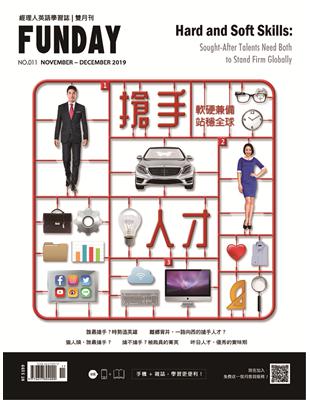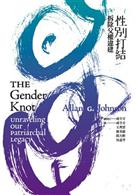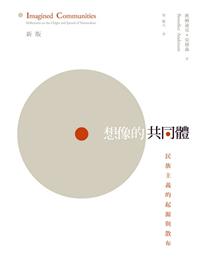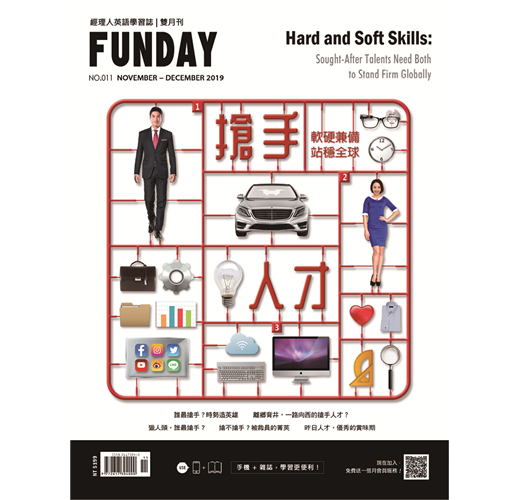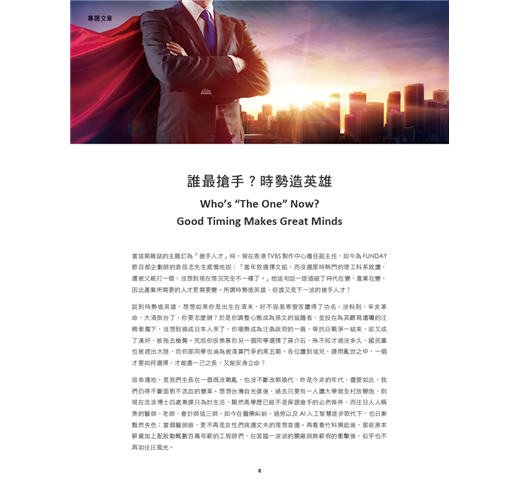〈誰最搶手?時勢造英雄〉
當這期雜誌的主題訂為「搶手人才」時,曾在香港TVBS製作中心擔任副主任,如今為FUNDAY節目部企劃師的袁信忠先生感慨地說:「當年我選擇文組,而沒選那時熱門的理工科系就讀,還被父親打一頓,沒想到現在情況完全不一樣了。」他這句話一語道破了時代在變,產業在變,因此產業所需要的人才更需要變。所謂時勢造英雄,但誰又是下一波的搶手人才?
說到時勢造英雄,想想如果你是出生在清末,好不容易寒窗苦讀得了功名,沒料到,辛亥革命,大清倒台了,你要怎麼辦?於是你調整心態成為孫文的追隨者,並投在為其聽寫遺囑的汪精衛麾下,沒想到換成日本人來了,你順勢成為汪偽政府的一員,等抗日戰爭一結束,卻又成了漢奸,被拖去槍斃。死前你很羨慕你另一個同學選擇了蔣介石,殊不知才過沒多久,國民黨也被趕出大陸,而你那同學也淪為被清算鬥爭的黑五類。各位讀到這兒,請問亂世之中,一個人才要如何選擇,才能盡一己之長,又能安身立命?
很幸運地,是我們生長在一個既沒戰亂,也沒不斷改朝換代、昨是今非的年,
儘管如此,我們仍得不斷面對不流血的變革。想想台灣自光復後,過去只要有一人讀大學就全村放鞭炮,到現在流浪博士四處兼課只為討生活,顯然高學歷已經不是保證搶手的必然條件,而往日人人稱羨的醫師、老師、會計師這三師,如今在醫療糾紛,過勞以及AI人工智慧逐步取代下,也日漸黯然失色;當個醫師娘,更不再是女性們挑選丈夫的理想首選。再看看竹科興起後,那些原本薪資加上配股動輒數百萬年薪的工程師們,在面臨一波波的關廠與無薪假的衝擊後,似乎也不再如往日風光。
錢雖然不是萬能,但薪水的高低除了反應出老闆看待你的價值,其實也直接顯示出你是不是一個搶手人才。就行政院主計局公布的薪資分布圖來看,年薪80萬以下的人約占受薪階級8成,而你是不是屬於金字塔頂端?當然也有些職缺很搶手但待遇卻不高,這類大多是門檻不高、取代性高的工作,而這些就業者雖有市場需求但難以被稱為人才。根據104人力銀行資料庫顯示,2018年台灣排名前10高薪的職業,除了第4名的藥師之外,其餘都是軟體或生物醫療研發工程師,尤其,數位IC設計與類比設計工程師更蟬聯了前一、二名,由此可推論5G產業發展,造成AI及大數據和區塊鍊人才需求大增,供不應求下,薪資自然也跟著水漲船高。
搶手人才除了要有專業能力外,更重要的是,還必須具備能維持工作的熱情,不僅得盡快融入企業文化,也需擁有批判思考和創新的能力,以及應對複雜與含糊不清狀況時,能夠聚焦且解決問題的鎮定力。但千里馬還是需遇到伯樂,所謂「想要基業長青,就要讓人才先行」,公司的經營者要懂得如何領導搶手人才,因為員工的執行力就是來自老闆的領導力及溝通力,否則蜜月期一過,那些發揮不出價值的搶手人才,反而變成耗損公司資源的燙手山芋。
每年都有人要退休,也有人變成職場新鮮人;每天都有人被高薪錄用,也有人黯然遭資遣離職。所謂長江後浪推前浪,一代新人換舊人,如今這新人、舊人已不再只光用年紀來定論,唯有透過不斷地學習,並隨時察覺調整,才可能既斜槓又能跨界混種,就如同《禮記.大學》所記:「苟日新,日日新,又日新。」一個能持續迭代更新,又有真本事的人,才是一個能不斷進化的搶手人才。
Who’s “The One” Now? Good Timing Makes Great Minds
When FUNDAY set the theme for this issue, “Today’s Hottest, Most Talented Minds,” one-time deputy director of TVBS Hong Kong and FUNDAY’S current director of programming, Yuan Xin-Zhong, recalled with a sigh: “When I was a student I chose to go into the less popular liberal arts program, instead of science and engineering. I was beaten by my father for it. I didn’t expect that today’s scenario would be so different.” This sentiment speaks to the fact that industries are changing more rapidly than ever; therefore, young minds need to adapt. Talented minds can’t rely on their intellect alone; they must also be in the right place at the right time. So, who will be in the next wave of “sought-after” talent?
For some perspective, think about those living in the late Qing Dynasty. Recognizing that the Xinhai Revolution was coming would have been paramount in choosing whom to work with. If a scholar was aligned with the Qing, they would have to quickly recalibrate their thinking after the dynasty fell, and become a follower of Sun Yat-sen. At that point, they might find themselves working with the dictator Wang Jing-wei, a puppet ruler who collaborated with the Japanese.I If one was to become loyal to Wang, they would probably regret it in the end; after the war against Japan ended, anyone who had worked with Wang Jing-wei was shot to death. As they were nearing death, they probably thought, “Why didn’t I work for Chiang Kai-shek, like my classmate?” That same classmate, however, might have also been second-guessing himself as the Chiang Kai-shek-led Kuomintang was later driven from China. At that point, even that classmate would have been considered an enemy of the Cultural Revolution and marked for death by the communists. Which brings us to the question: in tumultuous times, how can a talented mind choose where to lay their head and funnel their energy?
Fortunately, we’ve grown up in an era without war or revolution. Despite this, we still have to face constant changes. Take Taiwan for example. In the not-so-distant past, if one person got into college, their whole village would set off fireworks in celebration. Today, we have Ph.D.’s roaming the streets, just trying to make ends meet. It is obvious that a higher education no longer ensures that anyone will be a sought-after “talent” after graduation. Doctors, teachers and accountants were all lauded in the past, but they now face an unknown future. The medical profession, for example, is losing its luster due to malpractice claims, overwork and AI encroachment. Today, physicians are no longer the ideal choice for a woman choosing her husband! Engineers working in the high-tech industry in the Hsinchu Science Park once made millions of dollars a year (with stock options), but they don’t seem to be doing as well now, with the industry facing a wave of factory closures and layoffs.
Although money is not everything, salary does reflect the value of an employee. In fact, there is a direct correlation between salary and how “sought after” you are. Judging from a salary distribution chart published by the Executive Yuan’s Bureau of Accounting, people with an annual salary of less than NT$800,000 account for about 80% of those employed in Taiwan. Are you at the top of the pyramid? Of course, there are some jobs that are very hot right now, but are not very high-paying. Most of these jobs have low standards and the workers are easy to replace. These workers are not considered “sought after talent,” despite market demand. According to data from 104 Job Bank, 2018’s top 10 highest-paying jobs in Taiwan were all in the software or biomedical R&D fields (except for pharmacists who ranked 4th). In particular, digital IC design and analog design engineers ranked first and second. Apparently, the development of the 5G industry has led to a huge increase in the demand for AI, big data and blockchain experts. Since these tech-driven minds are in short supply, their wages naturally rise.
In addition to professional competence, talented minds must also maintain enthusiasm toward their work. They must not only integrate into the corporate culture as quickly as possible, but also have the ability to think critically and be innovative, while dealing with complex yet ambiguous problems. This requires the ability to focus and solve problems. However, great talent first needs to be recognized in order for it to flourish. As the saying goes: “In order for a company to thrive in the long term, it must have the right talents in place to lay the groundwork; it is they who will pave the way.” Corporate leaders must know how to guide talented minds, as it is their execution that allows employees to take positive action. If a company lacks strong leadership, a “talent” who has yet to demonstrate their value soon becomes a hot potato that merely consumes company resources.
Every year, senior employees retire and new ones are hired; some are offered high salaries and others are laid off. Waves of employees arrive as new generations replace the old. The workers of this era must continuously learn and make adjustments to new terrain as they become slashies and hybrid talents. As the Great Learning in the Book of Rites goes: “If you can one day renovate yourself, do so from day to day. Yea, let there be daily renovation.” A person who continuously renews their skills and evolves can always remain a “sought-after talent.”




